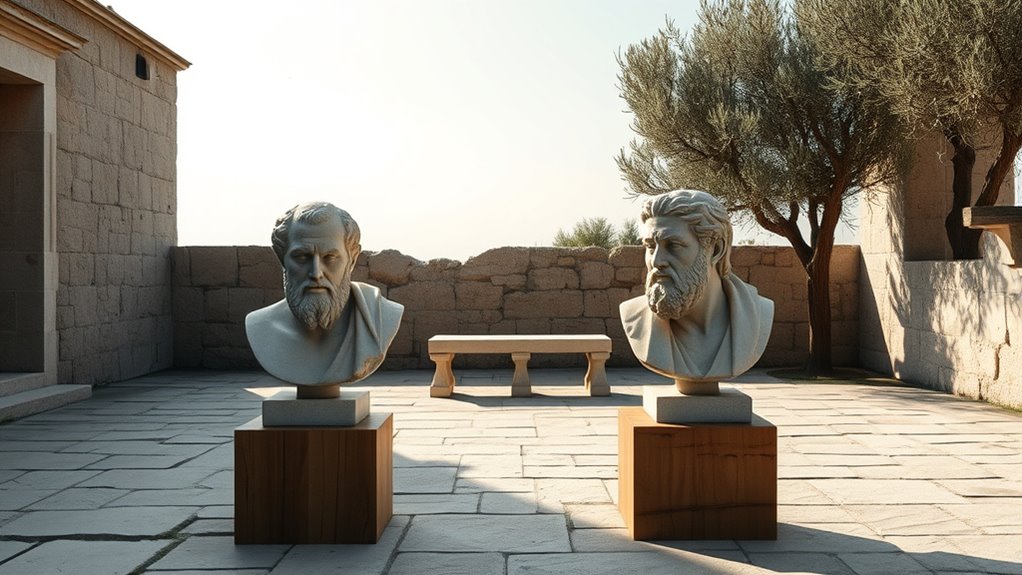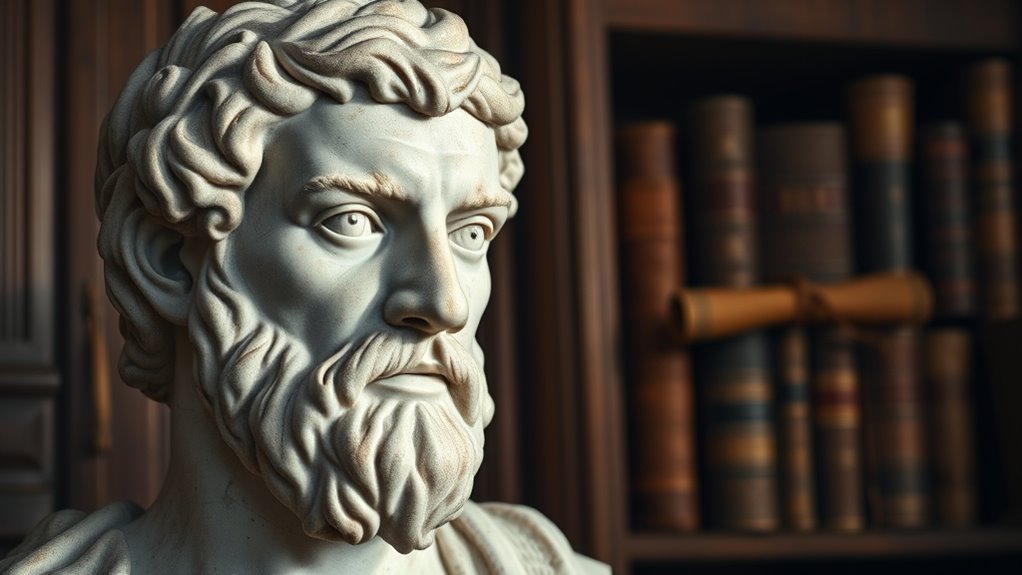The Stoics borrowed heavily from Socrates’ emphasis on the pursuit of virtue and moral excellence, urging you to focus on acting according to reason rather than passions. They adopted Socrates’ method of questioning and dialogue to seek moral clarity and understand objective truth. Self-examination and ongoing reflection are core Stoic practices, helping you cultivate integrity and live an examined life. If you want to explore more about these philosophical connections, keep exploring how Stoicism was shaped by Socratic ideas.
Key Takeaways
- Emphasis on virtue as the highest good and central to a fulfilled life.
- Use of dialectic and questioning to clarify moral concepts and challenge assumptions.
- Focus on self-examination and ongoing moral self-improvement.
- Belief in living according to reason and aligning with nature’s rational order.
- Cultivation of moral integrity through honest reflection and consistent character development.
The Pursuit of Virtue and Moral Excellence

Although Stoics developed their ideas independently, they borrowed heavily from Socrates in their pursuit of virtue and moral excellence. You’re encouraged to seek virtue as the highest good, believing it’s central to living a fulfilled life. The Stoics, like Socrates, emphasize self-examination and moral integrity, urging you to act according to reason rather than passion or external circumstances. They see virtue not just as a personal goal but as a way to align with nature’s rational order. Additionally, understanding environmental considerations helps you appreciate the importance of living in harmony with nature’s rational design. Recognizing the significance of moral education also underscores how cultivating virtue is essential for personal and societal well-being. Furthermore, the Stoics’ focus on rationality underscores its role in guiding moral choices and aligning with the natural order. Emphasizing moral development encourages ongoing growth in virtue as a lifelong process. A deep awareness of cultural intelligence can enhance your ability to navigate diverse moral perspectives and practices.
The Socratic Method of Questioning

You can see how engaging in dialectic helps clarify complex ethical ideas by prompting deeper reflection. Socrates used questioning to challenge assumptions and reveal inconsistencies in thought. This method encourages you to examine your beliefs critically and aim for moral clarity. Additionally, adopting diverse approaches such as considering different perspectives can further deepen understanding and foster open-mindedness. Practicing methods like questioning techniques also strengthens your reasoning skills and supports ongoing philosophical inquiry. Incorporating analytical thinking into discussions can help identify underlying assumptions and improve decision-making. Moreover, integrating automation technologies demonstrates how technological tools can enhance educational experiences and operational efficiency, illustrating the importance of a comprehensive approach.
Engaging in Dialectic
Engaging in dialectic involves a deliberate process of asking and answering questions to explore ideas deeply. You actively challenge assumptions, seeking clarity and understanding through conversation. Instead of accepting surface-level answers, you dig beneath, uncovering inconsistencies or gaps in reasoning. This method encourages you to contemplate multiple perspectives, refining your ideas as you go. The goal isn’t to win an argument but to arrive at truth or wisdom through mutual inquiry. You listen carefully, respond thoughtfully, and adapt your questions based on new insights. Engaging in dialectic also fosters critical thinking, helping you to evaluate ideas more objectively. This dynamic back-and-forth sharpens your thinking, helping you identify what you truly believe and why. Additionally, practicing this method can improve your ethical reasoning by exposing you to diverse viewpoints and moral considerations. By engaging in dialectic, you develop a more disciplined, reflective approach to understanding complex concepts and ethical questions. Incorporating curiosity into this process can further enhance your ability to explore ideas thoroughly and openly, leading to richer insights. Recognizing the importance of digital literacy can also help you navigate online conversations more effectively, fostering respectful and meaningful exchanges. Moreover, understanding the cultural significance of dialogue techniques can deepen your appreciation for how different societies approach inquiry and debate.
Clarifying Ethical Ideas
Clarifying ethical ideas often begins with asking precise, probing questions to uncover the assumptions behind them. You challenge your beliefs by questioning their foundation, which helps reveal inconsistencies or hidden biases. Socrates used this method to push others to define their ideas clearly, moving beyond vague notions of virtue or justice. This rigorous questioning is similar to the careful attention paid during Halloween preparations, ensuring every detail is considered and aligned with safety and tradition. Recognizing patterns of emotional dysregulation in BPD can help clarify the underlying causes of unstable relationships and self-image, much like how questioning assumptions clarifies ethical beliefs. Additionally, understanding the trustworthiness and vulnerabilities of AI models like GPT-4 emphasizes the importance of ongoing inquiry and refinement in developing reliable tools. Engaging in dynamic communication exercises can further refine understanding by encouraging openness and vulnerability in dialogue. Such exercises promote a systematic approach to exploring complex ideas, much like the structured process used in fuel injection cleaning at professional mechanic shops, which ensures optimal vehicle performance. Instead of accepting surface-level answers, you dig deeper, examining what you truly mean and why you believe it. This process sharpens your understanding and exposes contradictions, encouraging you to refine your ethical views.
Emphasis on Self-Examination and Reflection

You can improve yourself by practicing inner dialogue and regularly questioning your actions and beliefs. These habits help you become more aware of your moral virtues and areas for growth. Engaging in self-assessment can further deepen your understanding of your personal development journey. Regular reflection, such as evaluating your daily choices, can enhance your ability to recognize signs of spoilage in your character and behaviors. Incorporating mindfulness practices can also support your ongoing self-awareness and emotional regulation. Additionally, practicing stillness can foster a greater sense of clarity and inner peace, reinforcing your self-awareness efforts.
Inner Dialogue Practices
Inner dialogue practices, especially self-examination and reflection, form the backbone of Stoic philosophy. You actively engage in conversations with yourself, questioning your thoughts, actions, and motivations daily. This ongoing internal dialogue helps you identify areas where your judgments may be flawed or irrational.
By examining your responses to challenges, you learn to detach emotion from your reactions, fostering calm and clarity. Stoics emphasize the importance of honest self-assessment, encouraging you to confront your weaknesses without judgment.
This internal dialogue sharpens your awareness, guiding you toward virtue and resilience. Over time, these practices cultivate self-control, enabling you to navigate life’s difficulties with equanimity.
Ultimately, your inner conversations serve as a mirror, revealing insights that help you live more intentionally.
Habitual Self-Questioning
Practicing habitual self-questioning sharpens your ability to examine your thoughts, motives, and actions regularly. When you pause to ask yourself why you reacted a certain way or what drives your decisions, you develop greater self-awareness.
This ongoing reflection helps you identify patterns, recognize biases, and correct unhelpful behaviors. By making self-questioning a daily habit, you become more intentional with your choices and better aligned with your values.
It’s not about self-criticism but about honest assessment. Over time, this practice cultivates clarity and resilience, empowering you to respond thoughtfully rather than react impulsively.
Ultimately, self-questioning becomes a tool to deepen your understanding of yourself and live with greater purpose and integrity.
Cultivating Moral Virtue
Cultivating moral virtue requires ongoing self-examination and reflection, as these practices serve as the foundation for ethical growth. You should regularly assess your actions, motives, and thoughts to identify areas for improvement. This process helps you stay aligned with your values and develop integrity.
Reflection isn’t a one-time event; it’s a continuous effort to understand your behavior and learn from your experiences. By questioning your choices and motives, you build self-awareness and strengthen your character.
The Stoics emphasized that virtue isn’t something you achieve once but something you cultivate daily through honest self-assessment. This disciplined approach keeps you mindful of your ethical responsibilities and guides you toward becoming a better, more virtuous person.
Commitment to Ethical Integrity

Although the Stoics didn’t directly adopt Socrates’ methods, they shared his unwavering commitment to ethical integrity. You recognize that acting rightly isn’t about external success but staying true to your principles.
The Stoics believed that integrity guides your actions, regardless of the circumstances. To uphold this, they emphasized:
- Consistently aligning your behavior with your core values.
- Facing challenges honestly, without compromising your morals.
- Owning your mistakes and learning from them instead of hiding or rationalizing.
This unwavering dedication helps you build a resilient character rooted in honesty and virtue. Like Socrates, the Stoics see integrity as essential for living a good life—one where your internal harmony reflects your moral commitments.
The Value of Dialectical Dialogue

Dialectical dialogue serves as an essential tool for exploring and refining your beliefs, as it encourages active engagement and critical thinking. When you engage in meaningful conversations, you challenge assumptions and uncover underlying reasons behind your views. This process helps you identify inconsistencies and gaps in your understanding, pushing you toward greater clarity.
Socrates used dialectics to question others, guiding them to see their beliefs more clearly. For the Stoics, dialogue was crucial in developing virtue and wisdom, as it fostered humility and openness. By participating in honest discussions, you develop self-awareness and sharpen your reasoning skills.
Ultimately, dialectical dialogue isn’t just about debating; it’s a dynamic method for cultivating wisdom through thoughtful exchange.
The Search for Objective Truth

Have you ever wondered if there’s such a thing as an absolute, unchanging truth? The search for objective truth drives many philosophical debates, especially among Socrates and the Stoics. You might ask yourself: Is truth universal or subjective?
Socrates believed in questioning everything to discover what’s truly real. The Stoics adopted this idea but emphasized that some truths are fixed and discoverable through reason.
To explore this further:
- Question assumptions regularly to uncover what’s genuinely valid.
- Seek consistency in your beliefs, aiming for truths that hold regardless of circumstance.
- Understand that some truths might be timeless, waiting to be uncovered through careful reflection.
This pursuit shapes how you approach life, guiding you toward clarity and integrity in your beliefs.
The Importance of Living an Examined Life

Understanding the nature of truth requires more than just identifying what’s real; it calls for continuous reflection on your beliefs and actions. When you live an examined life, you actively question your motives, values, and decisions.
Living an examined life involves ongoing reflection on your beliefs, motives, and actions to seek truth and personal growth.
This habit helps you recognize inconsistencies and biases, leading to personal growth. Socrates emphasized that self-awareness is essential for a meaningful existence.
By regularly scrutinizing your life, you avoid blindly following societal expectations or impulsive desires. Instead, you develop clarity about what truly matters.
This ongoing process strengthens your character and guides you toward virtuous living. Living an examined life isn’t a one-time effort; it’s a daily practice that cultivates wisdom, resilience, and authenticity—core principles that both Socrates and the Stoics valued deeply.
Frequently Asked Questions
How Did Socrates Influence the Development of Stoic Ethics?
You see, Socrates deeply influenced Stoic ethics by emphasizing the importance of virtue, rationality, and self-control. His focus on questioning assumptions and seeking moral truth shapes how Stoics approach living rightly.
You’re encouraged to examine your beliefs, develop inner resilience, and prioritize virtue over pleasure or material wealth. Socrates’ teachings inspire you to pursue wisdom and ethical consistency, forming the foundation of Stoic moral philosophy.
What Are the Key Differences Between Socratic and Stoic Virtues?
Imagine you’re scrolling through your social media feed; that’s a bit like understanding virtues today.
Socratic virtues focus on knowledge and the pursuit of truth, emphasizing moral understanding.
Stoic virtues, however, prioritize inner resilience, self-control, and living in accordance with nature.
While Socrates seeks to know what’s good, Stoics aim to embody these virtues, practicing them consistently for a tranquil life.
How Did Socratic Questioning Shape Stoic Practical Philosophy?
You see, Socratic questioning deeply influences Stoic practical philosophy by encouraging you to examine your beliefs and actions critically. It pushes you to seek clarity and truth through relentless inquiry, helping you identify what’s within your control.
This method fosters self-awareness and ethical living, which are essential to Stoic practice. By questioning assumptions, you learn to respond thoughtfully rather than react impulsively, aligning your actions with reason and virtue.
In What Ways Did Stoics Adapt Socratic Ideas for Their Own Teachings?
You see, the Stoics adapt Socratic ideas by emphasizing self-examination and virtue as central to a good life. They use questioning techniques to challenge assumptions, encouraging you to seek wisdom and inner peace.
Unlike Socrates, who focused on ethical dialogue, the Stoics apply these methods to acceptance of fate and emotional resilience. They make Socratic questioning practical, guiding you to live in harmony with nature and reason.
Why Is Socratic Humility Important to Stoic Moral Practice?
Socratic humility is essential because it reminds you to recognize your limits and stay open to learning.
As a Stoic, you understand that true wisdom comes from knowing what you don’t know, which helps you remain humble and focused on self-improvement.
This humility guides you to accept life’s uncertainties and stay resilient, fostering moral growth.
It keeps you grounded, encouraging continuous reflection and alignment with virtue.
Conclusion
You might think these ideas are just ancient echoes, but they’re alive in your daily choices. When you challenge your beliefs, seek genuine truth, and reflect honestly, you’re living the Stoic and Socratic legacy. Imagine yourself at a crossroads, choosing integrity over comfort—each step echoing Socrates’ questioning and the Stoics’ virtue. Embracing this mindset transforms ordinary moments into a pursuit of moral excellence, making your life a true demonstration to these timeless philosophies.









